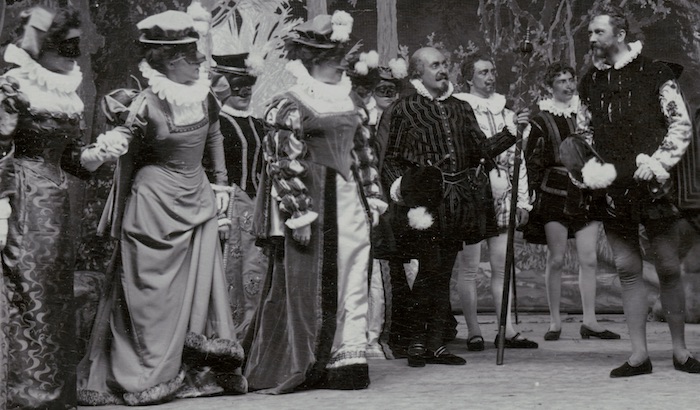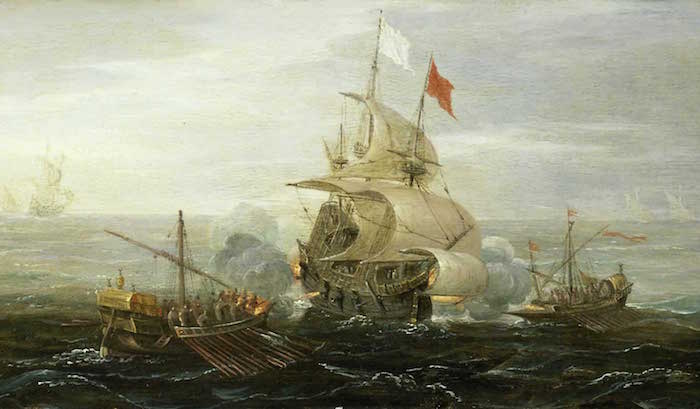1607 saw the world’s first amateur performance of Shakespeare – and not where you might expect. It occurred aboard the British merchant ship Red Dragon off the coast of West Africa. The cast and crew were all sailors. And it’s a wonderful example of how you can run a play at your table. Let’s take a look!

In 1607, the newly-formed British East India Company dispatched its third voyage to Southeast Asia to participate in the lucrative spice trade. The ships were the 600-ton Red Dragon, the 300-ton Hector, and the 100-ton Consent, all under the command of the eccentric William Keeling, captain of the Red Dragon. The Consent soon became separated from the flotilla and pressed on towards fame and fortune, leaving the Red Dragon and the Hector to dawdle along in her wake.
During the flotilla’s poky progress towards the East Indies, William Keeling kept his sailors occupied by ordering them to rehearse the plays of William Shakespeare. He felt that plays were a better way for the Red Dragon’s crew to spend their time than “idleness, unlawful games (gambling), or sleep”. In 1607, Shakespeare had just produced some of his greatest works, so Keeling had plenty to choose from.
When the flotilla arrived off the coast of Sierra Leone, Keeling brought aboard a Portuguese translator and treated him to a surprise performance of Hamlet. Later, still off the coast of Sierra Leone, Keeling treated the captain of the Hector to a performance of Richard II. Records of an additional performance of Hamlet by the Red Dragon off the coast of Socotra also survive.

At your table, a long voyage is the perfect place to stage a play. The PCs won’t have many other responsibilities, and it’ll make the journey memorable for your players. Keeling staged his plays at sea, but just about any mode of transportation is amenable to rehearsing a show. (And though I’m focusing on travel, you can obviously run a play even if the PCs aren’t going anywhere.)
It’s pretty easy to put on a play at the table. Select a script (a few pages from a decent play), and print some copies. Ask the players to select roles. If you have a particularly big group, you may want to ask for a volunteer to serve as director. If any of your players are particularly arts-‘n’-crafts-y, ask if they want to build some props with scissors, glue, and construction paper instead. Some players may want to memorize their lines to get ‘off-book’, while others may want to focus on coordinating their performances with the other players (“So if you’re reading that line as ‘indignant’, I should respond to that in my tone of voice…”). As your players rehearse, they’re entertaining themselves! The GM is barely involved.
Now, let’s complicate this thing! Some scholars think Keeling’s shows never happened. They suspect the surviving fragments of the log that reports these performances are forgeries! That possibility presents an adventure hook. A spurious rumor may give the party’s ship an unearned reputation as ‘the ship that performs plays’ – much to the PCs’ surprise! They pull into a port to find the governor expects a performance and won’t take ‘no’ for an answer. They have one night to prepare!
Or, for another surprise, the play may be unexpectedly consequential. The audience of the Red Dragon‘s first performance included a Portuguese translator. What began as a tool to keep sailors busy suddenly became a way to impress a potential business partner. A similar surprise could be fun for your players. Expect a certain amount of “Oh, if I knew this mattered, I would have been better prepared!”
You can also bring play back to the table with events like storms and bandit attacks. Interrupt rehearsals with warnings about threatening clouds or black sails on the horizon! Insert these spurts of action during natural lulls in the session.

If you’re looking for a good scene, here are three appropriate ones from Much Ado About Nothing. The script is here. The links below are the relevant scenes in the delightful Joss Whedon movie version.
2 actors: the middle part of Act I Scene I. The eternally witty Benedick and Beatrice spar verbally and proclaim how much they disdain one another. They will fall in love and get married before the play is out.
4 actors: Act II, Scene III, from the midpoint almost to the end. Three men conspire to trick their friend Benedick into thinking his nemesis Beatrice loves him so that he will fall in love with her.
7 actors (though some roles can be combined): Act IV Scene II. The idiot policeman Dogberry and his long-suffering watchmen interrogate the villain’s followers Conrade and Borachio.

Finally, this is the two-year anniversary of the Molten Sulfur Blog, and I’d like to talk about where you and I have been and where we’re going.
While we didn’t win the award, being nominated for an ENnie this year was an enormous honor. Thank you so much to the judges and to everyone who voted – you’re all amazing. To those of you I met at Gencon two weekends ago, it was a genuine delight to meet (or re-meet) you.
We’ve also seen a significant uptick in readership this past year. It’s hard to quantify who counts as a ‘regular’ reader, but the number of regulars has risen from about 30 this time last year to 200-ish now.
I’ve got some plans for the coming year! Your weekly Tuesday content isn’t going anywhere – I already have a five-month buffer written, edited, and in the hopper. But in addition to the blog, I’d like to start putting that content out as audio material on various podcast services and and as video content on Youtube. Everybody consumes media a little differently, and I want to make myself available in formats that meet people where they are. Also, I’m planning to roll out a Patreon here in a bit. I do this blog for the joy of it, but it costs me a pretty penny in used books, and it would be nice to recoup a bit of that expense.
I love writing this blog. It forces me to read books I otherwise wouldn’t, it improves my writing, and it gives me an excuse to think about cool RPG stories. It’s genuinely a joy to do. I expect to be hanging around, cluttering up your social media feeds for quite some time to come!
In the meantime, thank you so much for your readership. It really and truly means the world to me.
Game on!
-Tristan

Sources:
Dragon: Fragment of journal, William Keeling
Nathaniel’s Nutmeg by Giles Milton, 1999





